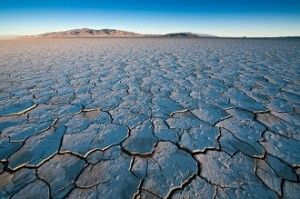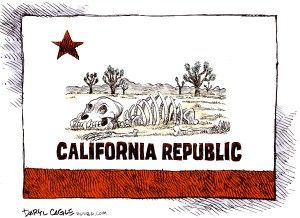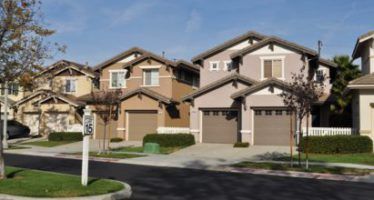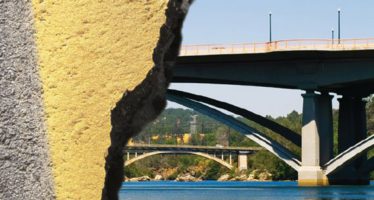Environmentalists face blame for drought
 As California’s potent drought inspired soul searching from analysts worried the Golden State can’t grow without water, politicians and officials focused on a more immediate task: laying blame for the problem.
As California’s potent drought inspired soul searching from analysts worried the Golden State can’t grow without water, politicians and officials focused on a more immediate task: laying blame for the problem.
Gov. Jerry Brown has tried to set a philosophical tone, cautioning that “we are embarked upon an experiment that no one has ever tried: 38 million people, with 32 million vehicles, living at the level of comfort that we all strive to attain. This will require adjustment. This will require learning.” But environmentalists have urged him to add water restrictions to California’s big farmers.
At the same time, environmentalism itself has become caught in the political crossfire.
Assigning blame
In recent radio remarks to The Blaze, likely GOP presidential contender Carly Fiorina castigated “liberal environmentalists” for creating a statewide “tragedy.”
“[D]espite the fact that California has suffered from droughts for millennia, liberal environmentalists have prevented the building of a single new reservoir or a single new water conveyance system over decades during a period in which California’s population has doubled,” she said. “There is a man-made lack of water in California — and Washington manages the water for the farmers.”
 Fiorina has not been alone in teeing up environmentalists for criticism over the Golden State’s dire straits. As The Hill noted, “Republicans in California and in Congress have proposed multiple times to beef up the state’s water storage with more dams and reservoirs. Environmentalists have pushed back and questioned the impact that the projects would have on the state’s water needs.”
Fiorina has not been alone in teeing up environmentalists for criticism over the Golden State’s dire straits. As The Hill noted, “Republicans in California and in Congress have proposed multiple times to beef up the state’s water storage with more dams and reservoirs. Environmentalists have pushed back and questioned the impact that the projects would have on the state’s water needs.”
In a related spat, Republicans at the federal level blamed environmental interests for President Obama’s threatened veto of a bill that would pump water from California’s Delta region into Southern California. The move drew howls from California’s Republican delegation.
When the president ordered Northern California water withheld to protect the tiny Delta smelt, House Majority Leader Kevin McCarthy, R-Calif., called the act a “culmination of failed federal and state policies that have exacerbated the current drought into a man-made water crisis. Sacramento and Washington have chosen to put the well-being of fish above the well-being of people by refusing to capture millions of acre-feet of water during wet years for use during dry years.”
Recently, faced with questioning on the drought, White House press secretary Josh Earnest rebuffed the matter. According to Politico, Earnest “said the Obama administration does not have any policy changes to share, and he listed steps that President Barack Obama has taken to offer relief to the state, such as sending $60 million to California food banks and $15 million for farmers and ranchers.”
“We’re going to continue to be in touch with California,” he concluded.
Fracking fight
At the same time federal water allocation has become a bone of political contention, the role of fracking in water consumption has also come under scrutiny. In furtherance of a law passed last year that requires oil and gas companies to disclose how much water they use, state officials told Reuters that last year that the figure hit some 70 million gallons’ worth.
But rather than bowing to objections from within his own party, Gov. Jerry Brown declined to crack down on the practice.
“Despite pressure from environmentalists, Brown has not called for a halt to fracking in the state, saying it is not a major drain on water supplies. ‘Hydraulic fracturing uses a relatively small amount of water – the equivalent of 514 households annually’ per well, said Steven Bohlen, the state oil and gas supervisor. About 100,000 gallons of water is used on average per well, he said.”
For environmentalists, who have been at odds with fracking for years, both in California and across the country, the drought’s intensity simply supplied yet another reason that the practice should end.
Related Articles
Governor Jerry Brown revives redevelopment agencies
Redevelopment is back in California. Four years after Governor Jerry Brown led the effort to eliminate redevelopment agencies, the governor has
Bridge woes compound California infrastructure troubles
Dams aren’t the only part of California infrastructure on the hot seat. Following a big-ticket Sacramento request for federal
New analysis ranks California nearly last in liberty
When it comes to liberty, California is one of the most restrictive states on its citizens, according to a new study. The




